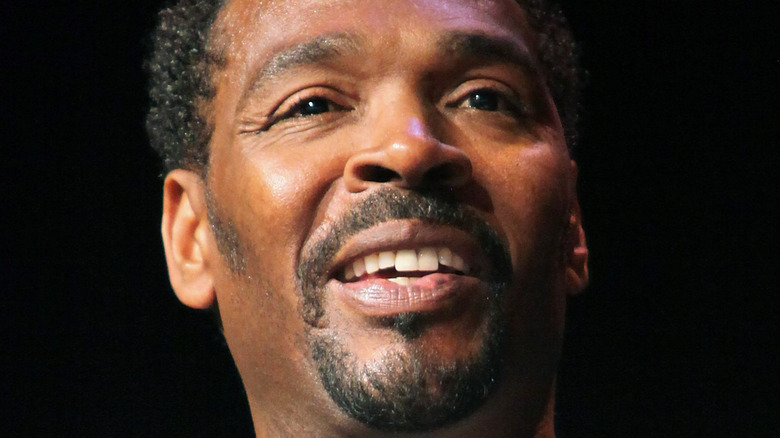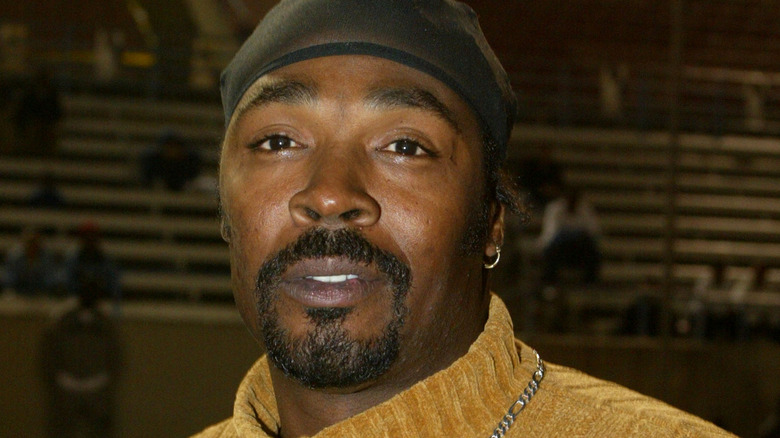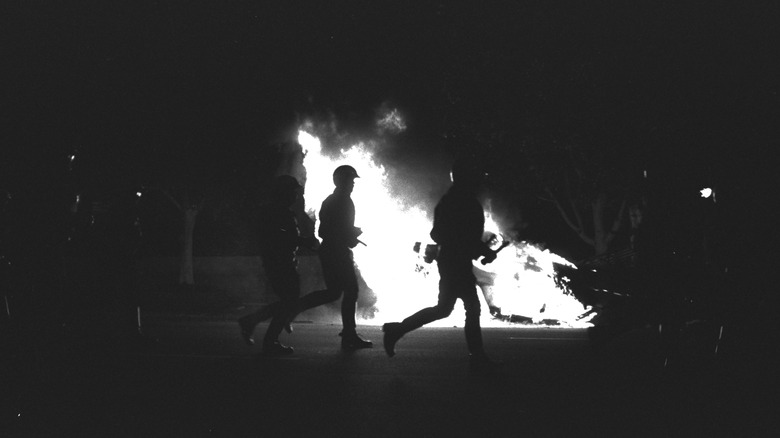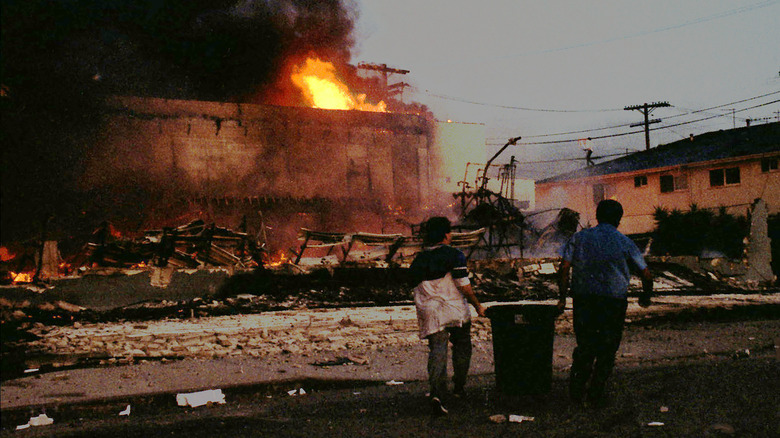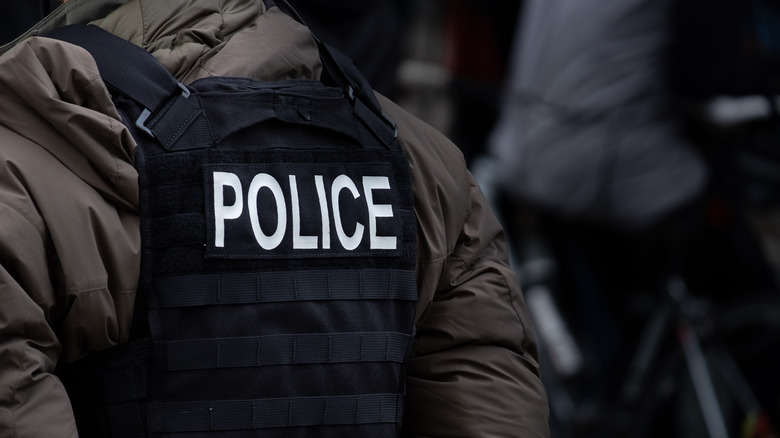What Happened To The Police Officers Who Assaulted Rodney King?
For many Americans, one of the most memorable events of the 1990s was the 1991 assault of Rodney King. Video of the brutal altercation, taken by a bystander, was broadcast across the nation, horrifying viewers (via History). The footage sparked a conversation about police brutality and racial equality. It also sparked the 1992 L.A. race riots after the four officers who beat King were acquitted of excessive use of force charges by a predominantly white jury.
Now, decades later, those riots and the assault on King continue to be relevant to politics and policing. The beating of King was not the first nor, sadly, the last example of police brutality in America. In 1999, for instance, a young Black man named Amadou Diallo was killed by police, and the acquittal of the officers involved led to protests (via Stacker). And in 2020, a Black man named George Floyd was killed by a police officer who kneeled on his neck during an arrest (via The New York Times). Floyd's death led to protests that reignited the Black Lives Matter movement (via CBS News).
Much news coverage has been made of the fates of the cops responsible for Floyd's murder. But what happened to the policemen who assaulted Rodney King?
Who was Rodney King?
Rodney Glen King was only 25 years old when he was severely beaten by a group of police officers in L.A. (via Biography). Born in 1965, King grew up in Southern California (via the African American Registry). Initially a construction worker, King was in his early 20s when he was convicted for robbery. By March 1991, King had been released from jail, though he was still on parole. That meant if King was caught breaking the law, he might be sent back to prison.
Later in life, King would describe himself as "only human," saying, "I'm not a perfect man," according to PBS. King was known to experience certain addictions, including alcoholism. In fact, King was drinking the night that he was assaulted by the police: Though King was initially pulled over for speeding, it was later revealed that he was driving under the influence at the time of his arrest, according to NPR.
If you or anyone you know is struggling with addiction issues, help is available. Visit the Substance Abuse and Mental Health Services Administration website or contact SAMHSA's National Helpline at 1-800-662-HELP (4357).
The assault of Rodney King
On March 3, 1991, in the early hours of the morning, Rodney King was driving home from a friend's house after having a few beers when cops clocked him for speeding (via History). King was driving at speeds as high as 115 miles per hour, according to Black Past. However, though King saw the sirens going off behind him, he didn't stop his car. Later, he shared that he was convinced that if the cops pulled him over and saw he was on parole, he would be sent back to jail and would "lose everything," according to NPR.
Instead, King led cops on a nearly 8-mile chase, in which helicopters and pursuit vehicles became involved before he finally stopped his vehicle. King was asked to step out of his car, which he did, but he refused to lay flat on the ground, so he was tasered. Then, after King got up to run, four police officers began kicking King and beating him with their batons. These officers were Stacey Koon, Laurence Powell, Timothy Wind, and Ted Briseno. Collectively, they may have hit King more than 50 times, as they repeatedly struck him for over a minute. When King was finally taken to the hospital, it was revealed that he had broken bones and teeth as well as permanent brain damage, according to NPR.
Aftermath of the beating
In another world, that might have been the end of the conversation about Rodney King. However, a bystander at a nearby apartment building had witnessed the entire event — and he caught it on tape, according to History. When the video was released to the public, there was an outcry, and the four officers involved were charged with excessive use of force.
The trial, which was held in a suburb of L.A., ended up coming back with verdicts of not guilty for almost every charge. The jury was predominantly white, with 10 white jurors, one Hispanic juror, and one Asian juror, according to Britannica. That led many people to believe that the not-guilty verdict was a result of racial bias, and protesters came out in huge groups to resist the ruling. Many of those protests eventually turned violent, sparking a days-long series of riots.
In the end, despite pleas from King himself to stop, the riots only came to an end after then-President George H.W. Bush sent in several thousand army troops and federal officers to quell the violence. All told, the unrest resulted in around a billion dollars worth of property damage, injured more than 2,000 people, and saw thousands of people arrested for looting and rioting (via NPR). Some 50 people were also killed during the riots.
Where are the officers today?
Though the four officers who assaulted Rodney King were deemed not guilty in their state trials, they were subsequently brought up on federal charges of violating King's civil rights. Two of the four officers, Stacey Koon and Laurence Powell, were given guilty verdicts (via History) and served 30 months in prison for their crimes (via Time). After his stint in jail was over in 1995, Koon was released into a halfway house, and a potential assassin discovered he was there and came to kill him, resulting in a standoff with officers; Koon was not harmed.
Later, Koon went on to write a book called "Presumed Guilty: The Tragedy of the Rodney King Affair," which netted him as much as $4 million (via the Los Angeles Times). In 2014, reports came out that Koon had been working as an L.A.-based limo driver since 2012 (via Inside Edition), though it's unclear whether he retains the position. In 2018, Koon was caught driving his personal car under the influence and placed on a three-year probation (via MyNewsLA.com).
For his part, Laurence Powell worked as a handyman after his release from prison, per CNN. Later, he moved on to computer retailing, according to the Los Angeles Times. At last note, Powell, who has a wife and two kids (via Time), lived in San Diego.
The other officers
In the past, Laurence Powell has expressed little remorse for his involvement in the beating of Rodney King, saying of King (via Time), "They parade him around and try to move him to be their spokesperson for the case, but when it comes down to the nitty gritty, he's just a petty criminal."
Less is known about Timothy Wind and Ted Briseno, who both avoided jail time for their involvement in King's beating but were fired from their LAPD jobs (via NPR). As of 1997, Briseno had made a name for himself in private security (via CNN), and by 2017 had moved to Illinois (via AP News). Wind tried to maintain a job in law enforcement, working part-time for the Culver City PD as a community service officer before moving in the midwest in 2000 to pursue a career in law (via the Los Angeles Times). But despite graduating from law school, Wind was struggling to find work as of 2004 because of his involvement in the Rodney King beating (via the Chicago Tribune). Today, he makes his home in Kansas, per AP News.
As for King himself? Tragically, he died in 2012 at the age of 47 after having drowned in his pool. He was potentially under the influence of drugs and alcohol at the time of his death, according to NPR.
